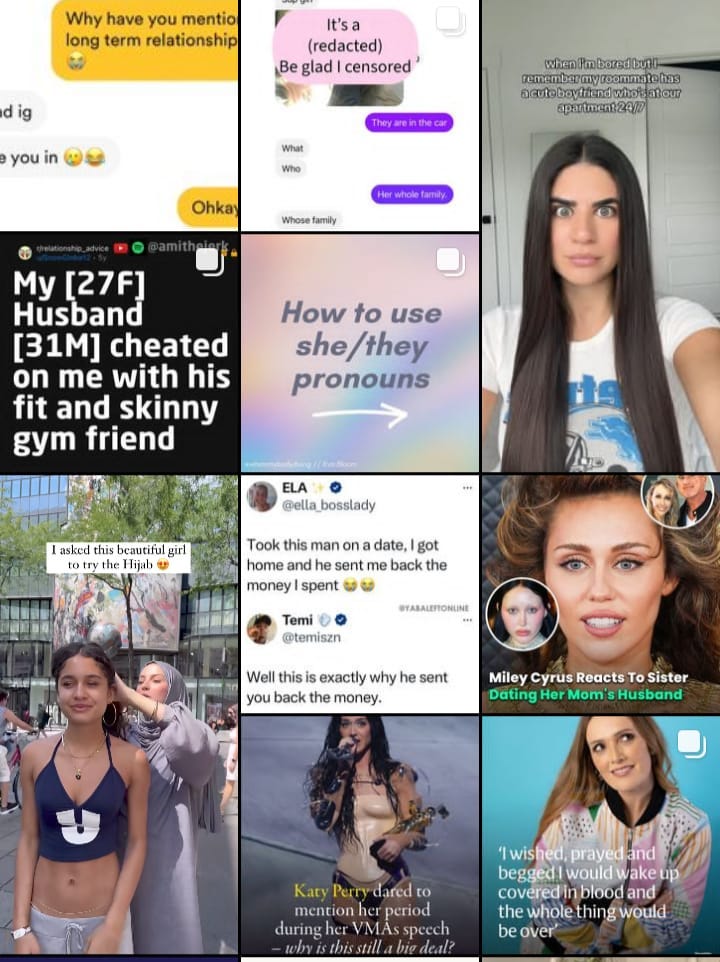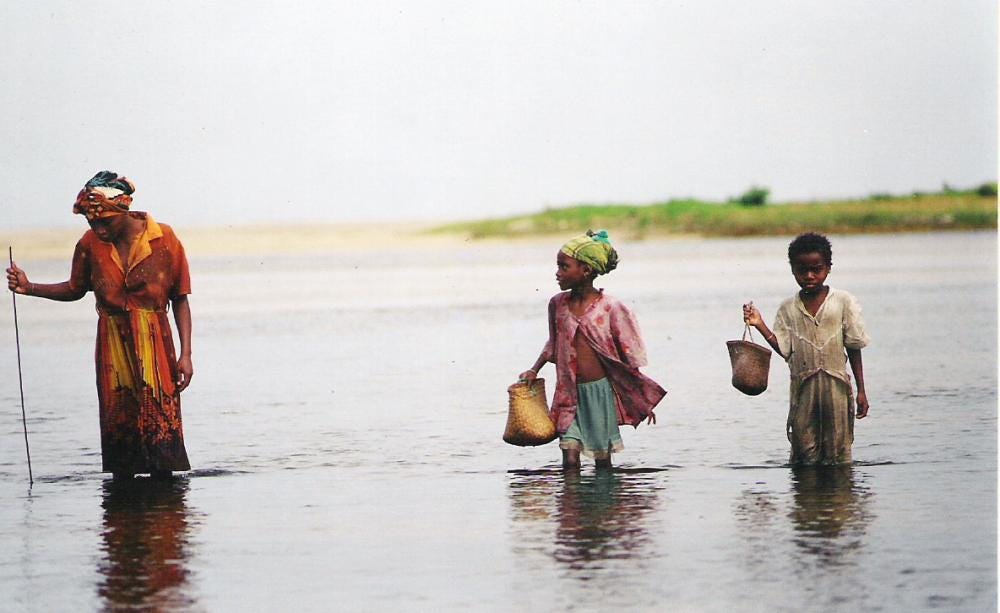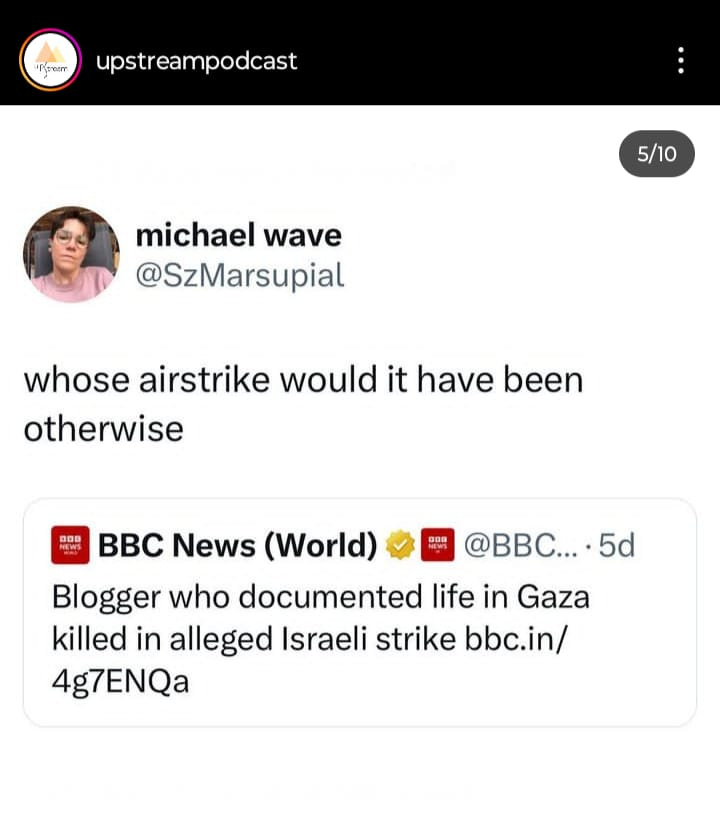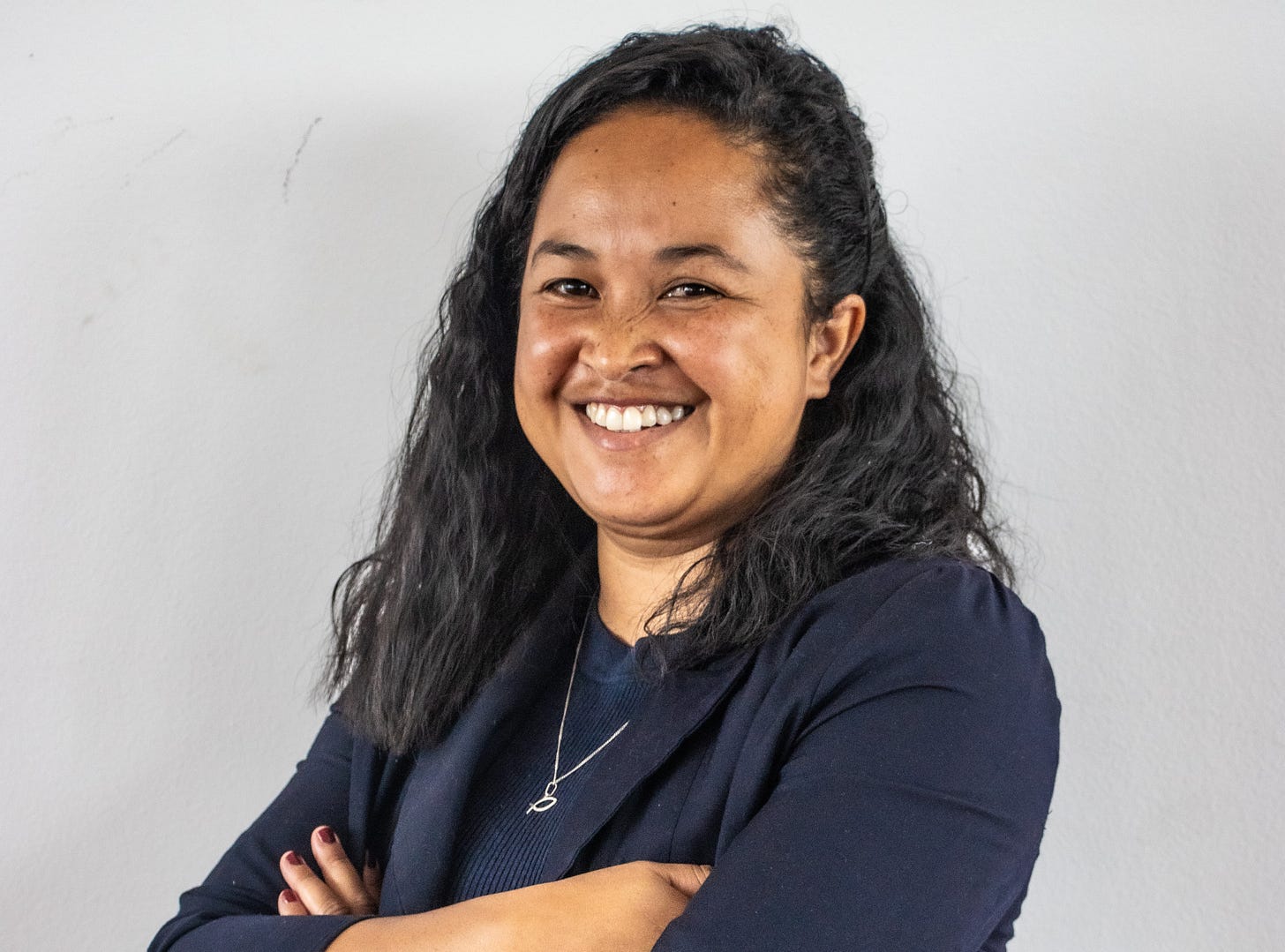It shouldn't be this hard to find out what's happening around the world.
On Instagram censorship, and a Q&A on mining projects in Madagascar.
Instagram stopped showing me content from Gaza.
I didn’t even notice at first. I was sick at home and scrolling mindlessly to pass the time (I am not a poster child for #wellness, let’s get that clear). And after some days of neverending content about travel to beautiful ‘underrated’ destinations and American couples playing pranks on each other (look how he reacts when I say I’m hanging out with a guy friend alone!), I started to feel something was missing.
I kept scrolling as if I’m looking for something. But it took me a while to figure out what that was. I thought about the families trapped in a genocide less now it wasn’t in front of my face each evening.

Instagram has been cracking down on content deemed ‘political’ - but failed to define what exactly this means - saying that it was ‘respecting each person’s appetite’ for politics.
As if current affairs is something we can switch on and off. Even when I post, using words like ‘vote’ or ‘degrowth’ is guaranteed to lower the reach of the content. Whose comfort are we preserving?
‘Out of sight out of mind’ is not a helpful mentality in a hyper-globalised society. To exist is to be political and to be connected to what’s happening in countries around the world.
Because what happens there, happens everywhere in different guises. I have never thought about mining in Madagascar before this edition, but the story is microcosm of the same story playing out around the world: one of corporations trying to seize power and hoard wealth, and locals fighting back.
It’s not that we have to know what is happening everywhere all the time. But we can never have a full picture of systemic injustice - let alone mobilise across nations to tackle it - when we only get curated fragments of the whole picture.
As privileged people with online platforms, we have a responsibility to seek out the voices that are being erased.
I think often of one sentence I heard from the Director the National Theatre of Gent on a talk about becoming a wheelchair user. He said “You never see people like us in the street. Do you think we are not there?”
What’s Going On?
The Hague becomes world’s first city to pass law banning fossil fuel-related ads.
Related: Fossil fuel ads work on you too – here’s how.Reducing ‘overconsumption’ of meat and dairy could cut one-sixth of food emissions.
Related: Five things to know about the new EU report on the future of farming.Fossil fuel companies’ funding of university research is delaying the green transition.
Related: Climate lawsuits being filed against fossil fuel companies have nearly tripled.At least three environmental defenders killed per week in 2023.
Related: Stop the heavy crackdown on climate protestors in the West.‘Plus-size people face a lot of barriers’: the campaigners helping larger walkers to enjoy the great outdoors.
Related: How anti-fatness crept into the environmental sustainability movement.
We work hard to keep The Green Fix free. If you have the means, please consider tipping us a virtual coffee.
If you don’t have the means to donate, we also appreciate a shoutout on social media. You can tag us on LinkedIn, @thegreenfix_ on Instagram, @TheGreenFix on X.
Focus On… Mining in Madagascar
Cass Hebron chats to Joëlle Ravelomanantsoa about the work to defend local communities from exploitative mining projects in Madagascar.
Translated with the help of Deepl. Original French transcript here.
My name is RAVELOMANANTSOA Tahiana Joëlle, and I am in charge of the Energy Transition project at Transparency International-Initiative Madagascar (TI-MG).
TI-MG is a Malagasy association founded in 2000. It is the national chapter of Transparency International. Our main mission is to fight corruption. This means taking action through:
Research: we carry out studies to shed light on the mechanisms and risks of corruption in our various sectors of intervention: mining, education, health, environment, land tenure, local governance, political integrity, etc.
Advocacy actions: in the form of advice to public authorities to defend the values of transparency, admissibility and integrity with public decision-makers.
Citizen and community mobilization: we work closely with our supporters, the Ligue national sur la Lutte contre la corruption, our Centres d'Assistance Juridique et d'Action Citoyenne, and the Maisons des Lanceurs d'Alerte in Madagascar's 6 provinces to encourage citizens to take up the fight against corruption.
Investigative journalism: through the NGO Malina, we sheds light on allegations of corruption in various sectors.
How does mining affect local communities and the environment in Madagascar?
Madagascar is rich in mineral and metal reserves, and the mining sector accounted for 32.2% of the country's total export volume in 2021. Despite the importance of this sector to the country's economy, the benefits are not felt by the population, and many concerns and grievances are often voiced by local communities living in the vicinity of these mining projects.
One of the oldest large-scale mining operations on the island is the Rio Tinto QMM mine (1998), and there are also artisanal and small-scale mining operations. Since 1998, the extractive industry has evolved, and the country currently has 3 major mining companies, QIT Madagascar Minerals, Ambatovy and Base Toliara.
Research carried out by TI-MG and the Publish What You Pay Madagascar coalition shows the impact mining operations have on local communities:
Impact on quality of life (loss of land and means of subsistence, loss of access to forest products): Before the Rio Tinto mine was set up, local people depended on nearby land, forests and water resources for their daily subsistence and energy needs. In 2005, the development plan for the region changed with the arrival of the mine and hundreds of people have been displaced for the region’s ‘public utility’ (for road development and mine infrastructure, ports).
Lake water contamination by heavy metals and harmful radioactive elements: In Mandena, water pollution caused by the QMM mine has led to a significant increase in uranium, thorium and lead in surface waters, affecting the health of residents (diarrhea, skin diseases, fevers).
“…Surface water is the most widely used source of water for cooking, hygiene and especially laundry, as well as for fishing. As a result, overall, more than half of Mandena's respondents (55%) reported water-related health problems. Although fewer in number, those who defended the quality of the water as “good” (8%) nonetheless admitted to having had ailments linked to its use. The most frequently cited problems (all water sources combined) were stomach aches and diarrhoea (50%), skin diseases (20%) and unexplained fevers (19%).”
Report - Water pollution in Mandena, Publish What You Pay, 2020
Why are destructive mining activities allowed?
Often, mining activities that are not responsible and do not contribute to the desired or expected outcome are allowed due to various interdependent factors, of which corruption plays a major role.
Here are some of the [reasons it’s allowed]:
Corruption in the granting of mining permits: Corruption within government agencies and related bodies can lead to mining permits being fraudulently obtained. Officials may accept bribes or be influenced by companies to obtain permits, even if this has harmful consequences for the environment.
Obsolete laws and regulations: Madagascar's mining policy dates back to 1998, and there is no binding law on assessing the social impact. The Office National pour l'Environnement (ONE) is responsible for monitoring and verifying all technical aspects of mining companies' monitoring documents and specifications. However, the law stipulates that travel expenses for inspections must be covered by the companies themselves. This creates a delicate relationship which may call into question ONE’s independence.
Weak enforcement: Despite the existence of environmental laws and regulations, their implementation may be limited due to corruption or a lack of resources. Breaches of standards may not be adequately sanctioned. During the construction of the weir for Rio Tinto in 2007, QMM requested the reduction of the buffer zone to 50m instead of 80m. A ministerial decree approved this request in 2015. Then in 2017, independent research confirmed that between QMM had violated the already revised 50m limit, and in 2019, the company admitted a 90m breach with a 40m encroachment on the bed of Lake Besaroy (the lake that communities use for fishing).
How can the needs of local communities and the environment be better represented in discussions about mining projects?

To better represent the needs of local communities and ensure that mining projects respect the environment. The following points should be considered:
Free, prior and informed consent: this process is essential to ensure that the needs of local communities are heard and understood by the mining project. A number of informative documents on how to carry this out are already available, and it is not a one-off procedure but a continuous one throughout the life of the project (research phase - mining phase - processing phase). When we visited local communities in Toamasina about the Ambatovy nickel mine project, the communities testified that the promoter did not explain the issues to them properly, and they did not use local dialects but came with lots of documents in French, and the communities understood nothing.
Rigorous Environmental and Social Assessment (EIA-S): make EIA-S compulsory and binding, because mining projects affect not only the environment, but also the social sphere (education, migration, community life as a whole: relocation of communities, compensation systems for land taken over by the mine, etc.).
Establish mechanisms for handling complaints and collecting grievances: It is crucial to establish transparent procedures for handling complaints and collecting grievances throughout the project. Such a system would ensure that local communities can lodge complaints and express their concerns about the consequences of mining projects, while promoting transparency and trust between the parties involved.
How can we, as readers in Europe, support measures to defend sustainability and human rights in the mining sector?
I already see this kind of conversation as valuable support. Publishing and sharing information about mining in Madagascar in international newsletters such as The Green Fix newsletter is an important form of support. This raises awareness among a wider audience and promotes transparency on these crucial issues.
We urge you to support our cause by making a donation to the TI-MG association if you believe in our mission. You can also write to us at contact@transparency.mg if you have any questions or would like to collaborate with us.
“Let's fight corruption together.”
By the way…
Apply to be a guest writer for The Green Fix! Introductions and Focus sections both open. We particularly welcome people from underrepresented backgrounds.
The Green Fix is now offering low-cost sponsored slots on the newsletter. Book your slot by emailing wearethegreenfix@gmail.com.
So Now What Do I Do?
LEARN SOMETHING
The Earth Commission came up with a short brief outlining a path towards a just world within planetary boundaries.
Brussels: Sign up to the Inclusion Revolution training on disrupting patriarchal workplace dynamics on 15th October. [Not free, recommend it as a work expense]
TRY SOMETHING NEW
Journalists can apply for the European media leaders climate solutions fellowship until 6th October.
Generation Climate Europe is looking for volunteers across communication, advocacy and administrative roles!
CHANGE THE SYSTEM
Join the #SpeakVolumes campaign urging clothing brands to reveal their annual production volume ahead of Black Friday (thanks Ruth MacGilp for covering this in her newsletter!)
Join the Global Climate Strike this Friday! We’ll be at the Brussels march.
Stay in the loop
You can follow us on Twitter @TheGreenFix, Instagram @thegreenfix_ and LinkedIn. Connect with Cass on Instagram @cass.hebron and LinkedIn Cass J Hebron.





Please don't use phrases like 'wheelchair-bound' -- they're ableist. I figured you would want to know. :)